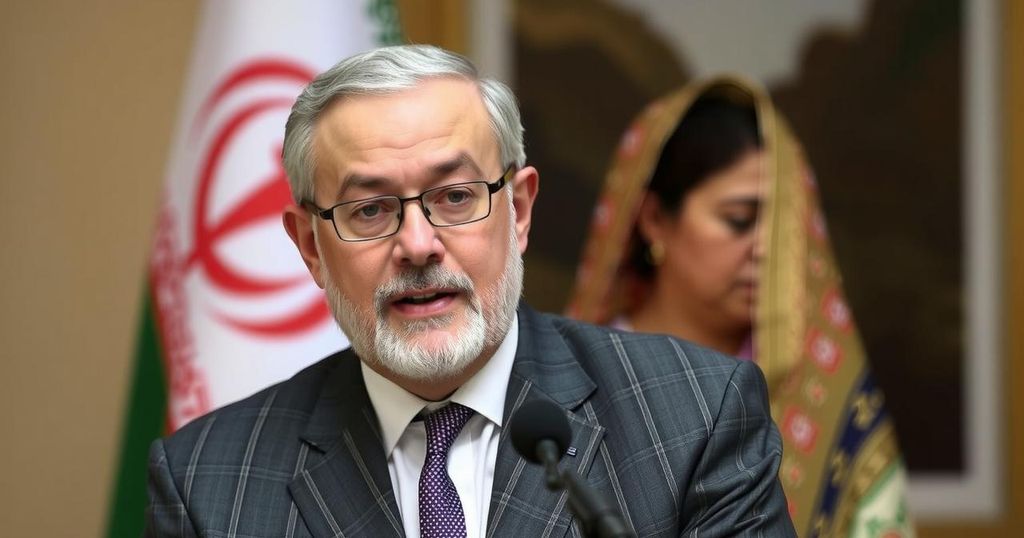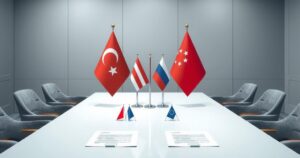New Syrian Leader Al-Julani Advocates for Regional Stability and Reform

Abu Mohammad al-Julani, Syria’s new leader, hopes for a reassessment of Iranian interventions and outlines a vision for future elections and stability in the region. He has engaged with diplomats to address sectarian issues and emphasizes inclusivity in government. Julani also expresses a desire for the dissolution of armed factions and the lifting of US sanctions, recognizing the significant roles of Saudi Arabia and Russia in Syria’s future.
Abu Mohammad al-Julani, Syria’s newly appointed leader, expressed hope in a recent interview with Al-Arabiya/Al-Hadath that Iran will reassess its regional interventions and policies. He conveyed that many within the region desire a constructive Iranian role, while also highlighting the efforts of the Military Operations Department in confronting Iranian interests. Julani outlined a vision for future elections in Syria, indicating a potential four-year timeframe for their realization. He believes that this transition from the Assad regime could usher in greater stability throughout the Middle East.
Julani has engaged in talks with Western diplomats and regional nations, addressing rising sectarian strife and protests in areas such as Lattakia, Damascus, and Homs. His approach combines flexibility with security measures, particularly in light of returning military personnel who had previously fled. He downplayed his own role, stating, “I do not consider myself the liberator of Syria. Everyone who made sacrifices liberated the country,” emphasizing collective efforts toward a peaceful transition of power that he believes will enhance security in the region for decades to come.
On the topic of constitutional reform, Julani anticipated a three-year period to draft a new constitution, followed by comprehensive elections. He emphasized the need for an inclusive National Dialogue Conference to address diverse societal components, noting the significant control that external forces like Turkey and the US-backed Syrian Democratic Forces have over various parts of Syria. He expressed that a year would be necessary for citizens to experience transformative changes in government services. Furthermore, Julani affirmed the commitment to protecting the right to protest and acknowledged the necessity for broader representation in government despite rapid appointments made during the transition.
Looking toward the future, Julani aims to dissolve the multitude of armed factions through dialogue, promoting the idea that groups like Hayat Tahrir al-Sham should disband. He also expressed a willingness to negotiate with the SDF for a constructive resolution in northeastern Syria. Moreover, he expressed optimism regarding potential US sanctions relief under President Donald Trump, highlighting Saudi Arabia’s significant contributions to Syria’s future, asserting, “I am proud of everything Saudi Arabia has done for Syria, and it has a major role in the country’s future.” He recognized Russia’s strategic importance and reaffirmed the historical partnership between Syria and Russia, indicating a favorable outlook from the latter towards the new Syrian administration.
The situation in Syria has evolved significantly following the fall of the Assad regime, leading to new leadership under Abu Mohammad al-Julani. His leadership comes at a critical juncture, where various factions, external influences, and internal tensions continue to shape Syria’s socio-political landscape. Julani’s statements reflect a strategic approach to regional diplomacy, particularly concerning relationships with Iran, the United States, and Saudi Arabia, while also addressing the complex dynamics within Syria post-conflict. This transition involves navigating a plethora of armed groups and achieving a sense of unity and stability in a fractured society.
Julani’s leadership marks a new chapter for Syria, characterized by hopes for a reformed political landscape and potential stabilization efforts. By advocating for engagement with key regional players and a recognition of internal diversity, he seeks to establish a government that represents a broader spectrum of Syrian society. However, the path forward will require addressing past divisions and fostering a reconciliatory environment amidst ongoing challenges from both internal factions and external pressures.
Original Source: www.jpost.com






